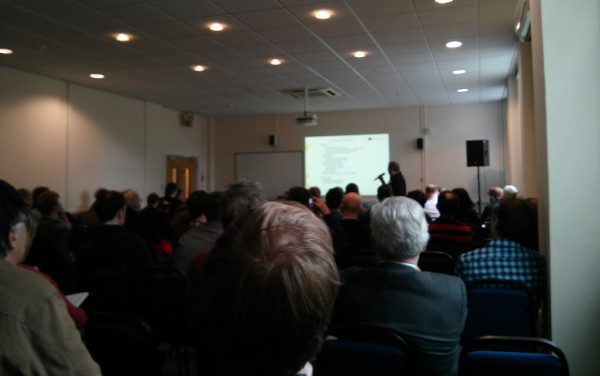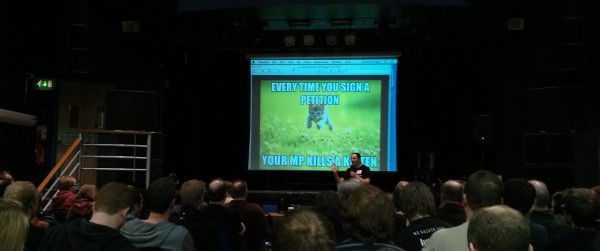OpenTech 2013
It's been a while since I've written a proper blog post but now that my 'professional' writing obligations are mostly out of the way I've been meaning to return to my amateur ramblings. As I attended OpenTech 2013 at the weekend I thought this was a great opportunity to get back into the swing of things. I've been to a few of these events now and they're always well organised and thought provoking, this year was no exception. Each of the six timetable slots through the day had three rooms with sessions and each of those sessions had 2 or (usually) 3 talks. So obviously I was only able to be in one of those rooms at once and see only about one third of the speakers, but I've assembled all those speakers into my OpenTech 2013 twitter list and in this post I'll give my potted impressions of each talk.
Session 1 (Stream C)
- Farmification - the joystick factory - Lisa Ma - When everyone is using touchscreen devices, what happens to all the people working in the mouse factories? Lisa has been creating programmes to encourage workers to do part time farming work so that they have something to fall back on when the hard times come. An interesting alternative to 20% time.
- House on Github - Francis Irving - Francis is recording issues with his house on GitHub, he thinks that in the same way that he put his CV online in 1996 and now everyone's doing it, by 2023 everyone will be doing this too. The serious point of the talk was that to effect change in the behaviour of the general population, to cross the chasm, requires geeks to hack the market, not just the tech.
- The Constitutional Excerpts Project - James Melton - a project to create semantically indexed and fully searchable database of the world's constitutions, because generally people that are writing constitutions are doing it for the first and only time in their lives and could do with some help.
Session 2 (Stream B)
- The Children's Republic of Shoreditch - Lucy Macnab - a fascinating project run from the back of a fascinating shop, I urge you to check out the video.
- Writers Centre Norwich - Chris Gribble - Chris wants 'creative people' and 'technical people' to get together and create fictional works featuring and about technology while still being 'literature'. However it was clear he'd never read any SciFi, which I think set him apart from most of his audience, and when directly asked why he didn't think 'technical people' couldn't also be 'creative people' his answer, even though he denied he thought that, described them as two separate communities who needed to be somehow united.
- School of Data - Tony Hirst - a project to educate civil society organizations, journalists and citizens in the skills needed to analyse publically available data and 'find the story' through a combination of outreach, training and crowd sourcing.
Session 3 (Stream B)
- Unix FPGA - Beyond just Finance - Graeme Burnett - using Field-programmable gate arrays in high speed trading platforms where 80GbE throughput will soon be a common requirement.
- Raspberry Pi - Rob Bishop - An interesting talk on problems and possibilities from one of the Pi developers. Although four fifths of the audience owned a Pi only one fifth had actually built something with one.
Session 4 (Stream A)
- Tiny Data - Richard Pope - A number of practical projects for easy data visualization, including the bicycle barometer.
- Bribing MPs with Crowdsourcing *Satire* (probably) - Terence Eden - definitely the most amusing talk of the day, but inspired some discussion on the serious issue of how the general public can overcome the concentrated buying power of rich people with special interests.
- The Domain Logic of Direct Action - Stephen Reid - Beautiful Trouble is a book and web toolbox that puts the accumulated wisdom of decades of creative protest into the hands of the next generation of change-makers.
Session 5 (Stream B)
- Big Data for Real People - Chris Osborne - The 4 rules of data visualization are that data should be:
- Personalized - relevant to the person viewing the data
- Accessible - don't set a science exam because, unlike you, most people dislike science (and graphs)
- Actionable - data is no use if you can't do anything as the result of seeing it
- Instinctive - recognizes human behaviour and the environment the decision is being made in
- Doing Good With (open) Data - Duncan Ross - As we enter the age of big data what will the legal and moral framework for using that data look like? The major pieces of legislation which govern big data are old (1995 for the EU Data Protection Directive, 1791 for the US Bill of Rights) and cannot hope to keep pace with the speed of change of the Internet. How will society ensure big business uses big data in a moral way when we're not event sure what that morality will be? DataKind UK brings together leading data scientists with high impact social organizations through a comprehensive, collaborative approach that leads to shared insights, greater understanding, and positive action through data in the service of humanity.
- What do Open Sensor Networks mean for citizen science? - Dan McQuillan - There is so much data available nowadays that statistical methods are often used in place of traditional knowledge gathering, for instance drone strike targets are governed by a data mining algorithm rather than on the ground intelligence. But this huge pool of data can be used for good if we can stimulate people with technical and data mining skills to consider social issues.
Session 6 (Stream A)
- The STEMettes - Stemettes - Providing events, support and strong role models for women in Science, Technology, Engineering and Maths. Role models are important: hack days delivered by women for women and girls produce better engagement than those delivered by men, similarly recruitment events delivered by a team including female members produce a far higher proportion of female applicants. Also women tend to be motivated by the outcomes rather than the opportunity to simply experiment.
- FOSSbox - Paula Graham - it is understood that diverse teams produce better solutions, but only 3% of FLOSS contributions are from women. Fossbox actively support women contributing to open source projects.
- Practical Diversity - Meri Williams - an excellent presentation with practical advice for fostering a more diverse work environment.
| Print article | This entry was posted by robertc on 23/05/13 at 02:09:00 am . Follow any responses to this post through RSS 2.0. |


 Hello! HTML5 and CSS3 available now
Hello! HTML5 and CSS3 available now Early access to HTML5 in Action available now
Early access to HTML5 in Action available now